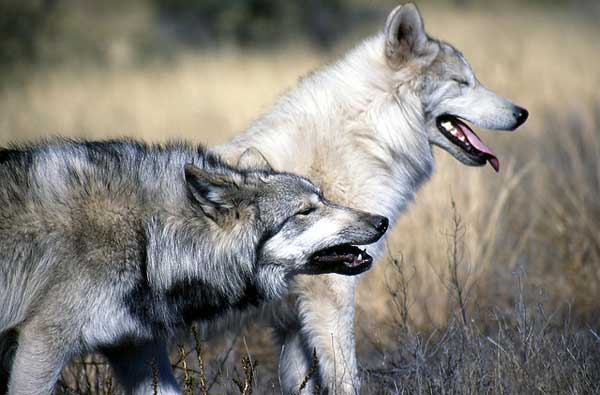Wolf Advocates Stymied in Search for Cull Details
Gary Allan’s hunt for information on winter killing a ‘frustrating exercise.’
Wolf Advocates Stymied in Search for Cull Details | The Tyee.Ministry officials killed 84 BC wolves last winter in an attempt to protect endangered mountain caribou. Photo by Caninest, Creative Commons licensed.
“It’s been a frustrating exercise,” said Gary Allan, who lives in Sointula near the northern tip of Vancouver Island where he operates an education and advocacy program called Who Speaks for Wolf.Critics of the B.C. government’s wolf cull say they’ve been stymied in their attempts to get detailed information about last winter’s killing of 84 animals.
Between the end of June and July 21, he and two other wolf advocates opposed to the cull received responses from the government to five requests they made under the province’s Freedom of Information and Protection of Privacy Act.
The government censored large sections of the records before they were released. It also withheld some pages it deemed “not responsive” to the request, a practice information and privacy commissioner Elizabeth Denhamruled in June the government was supposed to stop doing.
“I think these FOI requests and the material they have released shows quite clearly that they aren’t transparent,” Allan said.
Humane cull?
The government announced in January that ministry staff would shoot up to 184 wolves from helicopters before the snow melted in an attempt to protect endangered mountain caribou in two regions of the province. Wolves are easier to track when their footprints are visible in the snow.
On April 16 the province announced it had concluded the program for the year, having killed 73 wolves in the South Peace Region and 11 in the South Selkirk Mountains.
The records Allan and his colleagues sought included details about where and how the wolves were killed, their age and sex. Those details were supposed to be collected as part of the permit for the cull and would allow them to assess whether the cull was conducted as humanely as the government claims, he said.
“We were hoping they would be transparent with us and give us that information,” Allan said.
Getting a clean shot at a wolf from a moving helicopter is difficult and many of the animals likely suffered, he said. “They’re saying, ‘It’s the most humane way of doing it,’ and we’re saying, ‘Prove it.’ You can see what they’ve given us, which is absolutely nothing.”
Other records sought by the advocates included email messages to and from Tom Ethier, an assistant deputy minister in the Ministry of Forests, Lands and Natural Resource Operations.
Allan said they wanted to see what Ethier and other officials were saying in private about the cull. “We don’t take their words at face value. We need documents that show what they’re doing.”
A spokesperson for the Ministry of Forest, Land and Natural Resource Operations did not respond to questions by publication time.
‘Not responsive’
In their letters to Allan and his colleagues, officials in Information Access Operations cited several sections of the FOI act that allow public bodies to keep certain kinds of information secret, including cabinet and public body confidences, policy advice or recommendations, and information that could be harmful to the financial or economic interests of a public body if disclosed.
They also cited a section allowing the government to withhold “Information which could reasonably be expected to endanger the life or physical safety of a person” and information that could be “harmful to individual or public safety” if it were disclosed.
Three of the responses had parts withheld because they were “not responsive” to the wording of the request. One of the responses, released July 7, had eight “not responsive” pages removed.
It’s difficult to know whether the government has applied the FOI act correctly, and if the applicants have concerns they should take them to the Information and Privacy Commissioner, said Vincent Gogolek, the executive director of the advocacy group Freedom of Information and Privacy Association.
It’s clear, however, that the government is no longer allowed to sever parts of a record that it deems “not responsive” to a request and instead must cite specific sections of the act when it withholds information, he said.
“They’re not allowed to use that anymore,” he said. “The fact is that’s not the law, and the commissioner now has made multiple decisions on that.”
The wolf advocates have so far asked the commissioner to review the response to one of their requests, Allan said.
The plan to kill wolves divided environmental groups. Some condemned the cull, saying it punishes wolves when the real problem is that industries such as oil and gas, recreation and forestry have altered the landscape in ways that disadvantage caribou.
Others accepted the government’s argument that it is necessary to remove wolves to give caribou populations a chance to recover while steps are taken to protect habitat.
The government has said it intends to continue killing wolves for at least four more years in an effort to save the caribou. ![]()
